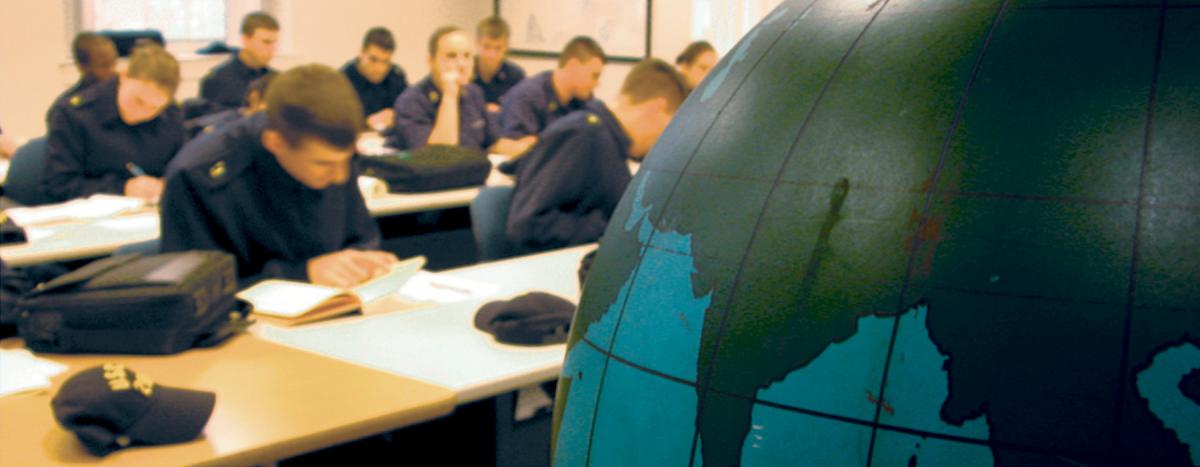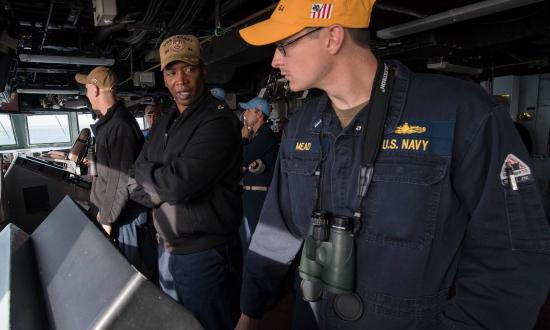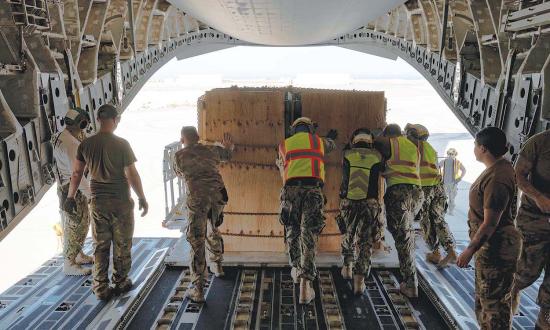The U.S. Sea Services are progressing and advancing at unprecedented rates. Propelled by a fast-paced and data driven society, the rapidly evolving operational environments require constant adaptation. Sea Service leaders, particularly junior officers, must align their leadership skills with the reality of how decisions are made in the digital age. The current era is characterized by cyber battlefields that evolve long before deliberately planned operational decisions can be executed; asymmetric adversaries that play by their own rules on land, at sea, in the air, and in cyberspace; and service members who crave to be treated as human beings, not just a number.
There is often little or no time for protracted decision-making processes that function in a linear fashion and require numerous briefs before taking action. Moreover, junior leaders must have a baseline education in general behavioral and cognitive science to advance the use of rapid-judgment decision-making tools such as “thin-slicing.” “Thin-slicing” refers to an individual’s unconscious ability to identify patterns in situations and behaviors and develop first impressions based on very narrow slices of experience and brief interactions. The ability to “thin-slice” effectively requires individuals to trust their instinct and rely on their subconscious intuition to make rapid-judgment decisions and draw conclusions about the people with whom they are interacting.
Establishing a Behavioral Science and Thin-Slicing Foundation
Ensuring leaders are prepared to make the best leadership and operational decisions starts with a strong foundation in behavioral and cognitive science, specifically psychology and human behavior. These foundations help bolster an individual’s confidence in relying on their subconscious intuition. A 2021 examination of the core courses required to graduate from the U.S. Naval Academy and U.S. Coast Guard Academy makes it clear there are many general science, math, nautical science, and navigation courses. However, there are few courses focused on leadership and, concerningly, zero core courses in psychology or closely related fields. The Naval Academy requires all midshipmen to successfully complete three academic leadership and ethics-based courses: Preparing to Lead, Ethics and Moral Reasoning, and Leadership: Theory and Applications. The Coast Guard Academy only requires two: Moral, Ethical, and Political Philosophy and Organizational Behavior and Leadership.
The Coast Guard Academy offers Managerial Psychology as an elective course primarily designed for management majors and Diversity and Leadership as an “on-demand” elective—meaning it is offered only when there is sufficient demand and available instructors. For the first time on record, the Coast Guard Academy now offers Introduction to Psychology, another elective course. The Naval Academy offers more behavioral-science centric courses such as Human Behavior, Social Psychology, Principles of Sociological Social Psychology, and Psychology of Leadership. However, despite these course offerings, they all are merely electives that many cadets and midshipmen never have time for in their academic program of study. Without such required training, how can we expect junior officers in the Coast Guard and Navy to have more than a basic understanding of the people they are charged to lead? How can we expect them to make good decisions and judgments rapidly and efficiently during dynamic operations?
To accommodate for required behavioral science courses, both service academies need to closely examine the core courses required to earn a bachelor of science degree. The Coast Guard Academy requires all cadets to successfully complete either Chemistry II or Physics II; both are four credit courses that are entirely unnecessary for Coast Guard junior officers. Part of the Naval Academy’s core curriculum includes Foundations of Chemistry II, General Physics II, and Calculus II and III; similar to the Coast Guard Academy, those courses should be electives for interested midshipmen to make room for behavioral science electives in the core curriculum.
Accompanying the academic course load at the Coast Guard Academy, the Chase Hall Practicum is a core leader development program that serves as the guiding curriculum for cadets’ 200-week leadership development journey. It is overseen and administered by company officers and chiefs. The practicum is grounded in various leadership theories, stresses experiential leadership development, and has seven units of instruction that range from leadership/officer development to Coast Guard administrative training to online mandated training.1 Both the core courses and leadership development programs at the Coast Guard Academy lack the necessary emphasis on psychology and human behavior to graduate fleet-ready ensigns who can confidently make good decisions quickly and thin-slice effectively.
An investment in cadet and midshipmen education in psychology and human behavior would enable more effective leadership upon graduation. Cadets and midshipmen would be better able to trust their instincts and subconscious intuition if they were developed over four years of academic and experiential leadership exercises. The ability to pick up on subtle clues (an example of effective thin-slicing) about the well-being of a subordinate, or the patterns and discrete priorities of their commanding officer, would enable junior leaders to provide tangible contributions to their units sooner and set them up for additional leadership success throughout their career.
Marine Corps Commandant General David H. Berger aptly stated that the Marine Corps must “treat people like human beings instead of inventory” as rising global challenges require mature, experienced leaders who possess multiple skills and can act on their own in the absence of communications with higher headquarters. For the Sea Services to treat service members as human beings instead of inventory, accession sources and senior leaders must invest in leaders’ baseline psychology and behavioral science education by providing robust psychology, sociology, and human-behavior courses and trainings. Moreover, such an investment would help eliminate the Warren Harding Error (when leaders make unconscious assumptions about a service member and hang on to them even when presented with evidence to the contrary) that many out-of-touch leaders routinely make.
Further, leadership in today’s Sea Services requires more critical, independent thought. Additional emphasis on psychology and behavioral science training will enable Generation Z leaders to avoid the poisonous echo chambers of destructive social media algorithms and think critically without excessive outside and unnoticed influences.2 Generation Z and social media are inseparable, and the Sea Services must act to ensure young leaders can make their own good, quick decisions, without undue outside influence.
Emphasize Thin-Slicing Throughout the Sea Services
Each of the Sea Services has risk management processes that guide high-risk training and other evolutions when ample time is available to develop in-depth plans, procedures, and risk mitigation measures. These deliberate processes are fundamental to the professional development of junior officers and allow them to confidently execute command direction, lead high-tempo operations, and manage even the most minute (yet demanding) collateral duties. Experts recognize that the effectiveness and thoughtfulness of a person’s decisions under fast-moving, high-stress conditions of rapid cognition are a direct function of training, rules, and rehearsal.3 Junior officers should not be sitting behind computers for hours developing risk-management decision matrices, or a 50-slide mission-planning brief. Rather, they should routinely fill high-stress roles on damage control training teams or execute simulated noncompliant boardings that use actual small boats and underway targets. Deliberately placing junior officers in demanding, high-stress roles during training evolutions and small-scale operations that have a chance for “above the waterline failure” will enhance their ability to thin-slice and pay dividends for the success of the Sea Services. Commands must make these high-stress and high-reward roles exciting and enticing for junior officers. When individuals are good at something they care about, whether work or a hobby, experience and effort invested in that interest will manifest, directly improving rapid-judgment decisions.4
As an example, when a junior officer is thrust into the role of boarding officer during a counter-narcotics boarding and has a sense that a suspect may unexpectedly reach for a weapon, an ability to thin-slice is paramount and may save lives. If a foreign affairs officer has prepared to brief one foreign dignitary, but another replaces them unexpectedly, a foundation in psychology and behavioral science may help maintain foreign relations and partnerships. Moreover, the ability to thin-slice combined with a foundation in behavioral science are imperative when leaders respond to disasters that require an interagency and interservice response.
When Hurricane Irma struck the Florida Keys in 2017, multiple units from the Coast Guard, Navy, various federal agencies, and Florida state and local agencies used the National Incident Management System (NIMS) Incident Command System (ICS) to respond. I led a Coast Guard deployable specialized forces team that deployed immediately after the storm struck land and saw firsthand the variety of responders and their experience levels. Some response personnel were nervous and distraught, some had more than ten years of disaster-relief experience, and some had never been to the Keys before. Among all these responders were leaders who could immediately build rapport with other agency representatives and understand the dynamics between agency resources and military units. In addition, they were able to identify patterns in typical and atypical response evolutions, empathize with others’ behaviors and needs, and have meaningful impact within ICS and the response.
Through thin-slicing, these leaders ensured that response efforts and state and federal programs were coordinated and executed properly to support the successful recovery efforts. Leaders who were unable to thin-slice—such as those who were too focused on minutiae during planning meetings and subsequent operations, and those who could not empathize with subordinates—hindered the effectiveness of recovery efforts and created unnecessary challenges and headaches for others.
Moving Forward
Understanding human behavior and harnessing the power of the subconscious is imperative for Sea Service leaders to achieve success regardless of career specialty, mission profile, or bridge watch position. The ability to thin-slice and understand human beings is arguably more important than knowing principles from Chemistry II or Calculus III or the detailed specifications of a ship’s engineering plant. Thin-slicing should not just be relegated to snap judgment decisions or those that may be seen as trivial. Similarly, behavioral science foundations should not just be for human resources experts. While society lauds well-thought-out ideas, plans, and procedures, leaders often do not have time to conduct a thorough analysis before they must make quick decisions. The Sea Services do not need leaders who consciously overthink and overanalyze every situation. On the contrary, leaders must learn to trust their gut feelings and subconscious intuitions. Leaders who succumb to “analysis paralysis” frequently reassess and change their decisions, and negatively affect personnel readiness and operational execution.
Commands must train for more than crew readiness and proficiency, and the Sea Services must develop junior officers who can make correct decisions quickly in stressful environments. Broadly, commands must create and support training evolutions in which rapid cognition is emphasized to enhance operational successes; a marker of skilled performance is the ability to deal with vast amounts of information swiftly and efficiently.5 Such abilities should start by bolstering leader development curricula at Navy, Marine Corps, and Coast Guard officer accession sources with behavioral science courses and placing additional training on developing leaders through high-stress roles that require quick decisions. For the Sea Services to best protect the American people, leaders must not get caught up in matrices and the mechanics before each decision. Instead, they must be able to efficiently and expeditiously assess problems, and then apply their knowledge of human behavior and subconscious experience to rapidly make sound decisions that support mission success.
1. U.S. Coast Guard Academy, Chase Hall Practicum Leader Development Handbook, Fall 2021–Spring 2022.
2. Malcolm Gladwell, Blink: The Power of Thinking Without Thinking (New York: Back Bay Books, 2005).
3. Gladwell, Blink: The Power of Thinking Without Thinking.
4. Gladwell, Blink.
5. Daniel Kahneman, Thinking, Fast and Slow (New York: Farrar, Straus and Giroux, 2013).






